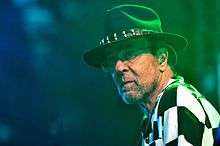Manfred Mann (musician)
| Manfred Mann | |
|---|---|
.jpg) Manfred Mann (1967) | |
| Background information | |
| Birth name | Manfred Sepse Lubowitz |
| Born |
21 October 1940 Johannesburg, Transvaal, Union of South Africa |
| Instruments | Keyboards, vocals |
| Years active | 1960s–present |
| Associated acts |
Manfred Mann Manfred Mann Chapter Three Manfred Mann's Earth Band |
| Website | manfredmann.co.uk |
| Notable instruments | |
| Keyboards | |
Manfred Mann (born Manfred Sepse Lubowitz,[1] 21 October 1940 in Johannesburg, Transvaal, Union of South Africa) is a South African–British keyboard player, guitarist, and vocalist best known as a founding member and namesake of Manfred Mann, Manfred Mann Chapter Three and Manfred Mann's Earth Band.
Early life and career
Lubowitz was raised in a Jewish family in Johannesburg, South Africa, the son of David Lubowitz and Alma Cohen.[2] He studied music at the University of the Witwatersrand, and worked as a jazz pianist at a number of clubs in Johannesburg. Between 1959 and 1961 he and his childhood friend Saul Ozynski recorded two albums as the Vikings – South Africa's first rock and roll band.
Strongly opposed to the apartheid system in his native South Africa,[1] Lubowitz moved to the United Kingdom in 1961 and began to write for "Jazz News" under the pseudonym Manfred Manne (after jazz drummer Shelly Manne), which was soon shortened to Manfred Mann.[3] The next year he met drummer and keyboard player Mike Hugg at Clacton Butlins Holiday Camp and together they formed a large blues-jazz band called the Mann-Hugg Blues Brothers. This eventually evolved into a 5-piece group and they signed a record deal with EMI in 1963, under the HMV label.
Manfred Mann also appeared as a jazz pianist in the 1969 Jesús Franco film Venus in Furs and performed the score for that film.
They changed their name to Manfred Mann at the suggestion of the label's record producer, and from 1964 to 1969 they had a succession of hit records: ("Do Wah Diddy Diddy", "Sha La La", "Pretty Flamingo", "Mighty Quinn"). The group split in 1969, and Mann immediately formed another outfit with Mike Hugg, Manfred Mann Chapter Three, an experimental jazz rock band. They disbanded after two albums, but Mann formed a new outfit in 1971, Manfred Mann's Earth Band, which still records and performs to this day. Their well-known hits included "Blinded by the Light", "Runner", "Davy's On The Road Again", and "Joybringer".

Mann has also released solo projects under "Manfred Mann's Plain Music" and "Manfred Mann '06."[4]
Style
Manfred Mann used various keyboard instruments through his career, but he is especially famous for his solo performance on Minimoog synthesizer. His keyboard parts are often improvised, inspired by jazz.
Discography
- See Manfred Mann discography, Manfred Mann Chapter Three and Manfred Mann's Earth Band discography.
- Plains Music
- Lone Arranger
Guest work
Manfred Mann played minimoog solo in the Uriah Heep song, "July Morning". He played keyboards on Trevor Rabin's album Wolf.
References
- 1 2 Robert M Corich and Andy Taylor, Sleeve Notes, The Best Of Manfred Mann's Earth Band Re-Mastered, 1998
- ↑ Benarde, Scott (2003). Stars of David: Rock'n'roll's Jewish stories. Hanover, NH: Brandeis University Press. p. 79.
- ↑ Roger Dopson, sleeve notes, Manfred Mann: The E.P. Collection, 1989
- ↑ "Manfred Mann &No. 124; Free Music Videos, News, Photos, Interviews, Lyrics, Tour Dates, Ringtones". VH1. Retrieved 2012-01-02.
External links
| Wikimedia Commons has media related to Manfred Mann. |
| Wikiquote has quotations related to: Manfred Mann (musician) |
- Manfred Mann discography at Discogs
- Manfred Mann's Earth Band Official Site